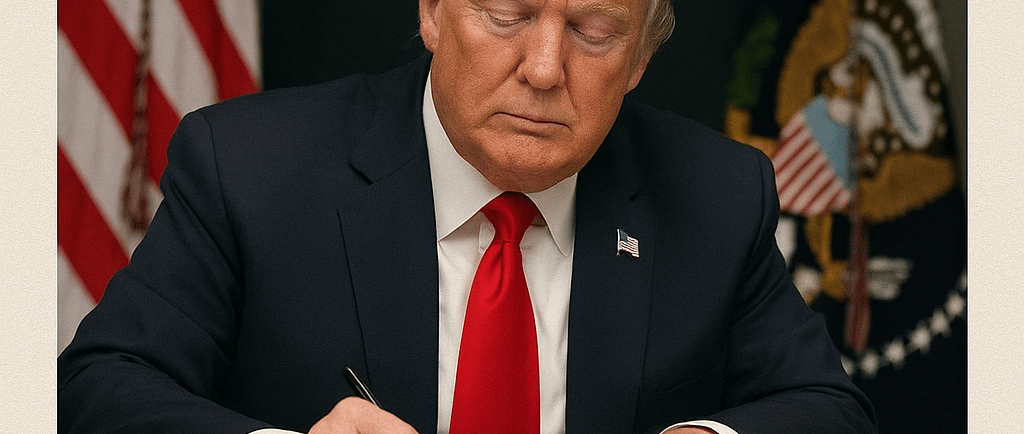“Pay to Stay”: H-1B Visas Hit With $100K Annual Charge
Donald Trump Trump signs proclamation imposing annual $100,000 fee on H-1B visas
NEWS
Click hub news
9/20/20252 min read


Trump Signs Proclamation Imposing $100,000 Annual Fee on H-1B Visas: A Blow to the Tech Industry On Friday, former President Donald Trump signed a sweeping proclamation that would impose an unprecedented $100,000 annual fee on H-1B visa applications. The move has sent shockwaves through the U.S. tech industry, which heavily depends on skilled workers from India and China.
What the Proclamation Means
The new policy requires employers to pay $100,000 each year for every H-1B visa holder they sponsor. This fee is a drastic departure from the current system, which involves a relatively modest set of processing and filing fees. Critics warn that the new cost burden could reshape the American labor market, particularly in technology, education, engineering, and healthcare.Howard Lutnick, the U.S. commerce secretary, defended the measure during a press briefing, stating that the administration had already secured the support of major corporations. “All the big companies are on board,” he said. “If you’re going to train somebody, train recent graduates from our great universities. Stop bringing in people to take our jobs.”
Why the Tech Industry Is Concerned
The U.S. tech sector is the largest consumer of H-1B visas, with companies like Amazon, Microsoft, and Meta Platforms employing tens of thousands of workers through the program. In just the first half of 2025, Amazon had over 10,000 H-1B approvals, while Microsoft and Meta each exceeded 5,000.Industry leaders argue that the H-1B program is essential for filling talent gaps in fields like software development, artificial intelligence, and advanced engineering. Tesla CEO Elon Musk, himself once an H-1B holder, has voiced strong support for the program, calling it a pipeline for the “world’s smartest talent.”
Venture capitalist Deedy Das warned that the new fee would deter top global talent from coming to the U.S. “If the U.S. ceases to attract the best talent, it drastically reduces its ability to innovate and grow the economy,” he wrote on X.
Legal Questions and Criticism
Immigration experts have already raised alarms about the legality of the move. Aaron Reichlin-Melnick of the American Immigration Council argued that the president lacks authority to impose such a fee. “The president has literally zero legal authority to impose a $100,000 fee on visas. None. Zip. Zilch,” he stated.
Under current law, fees are only meant to cover administrative processing costs, not to generate revenue or reshape immigration flows. If challenged, Trump’s proclamation may face significant hurdles in federal court, similar to previous attempts to restrict the H-1B program during his first term.
Potential Impact on Startups and Small Businesses
While large corporations may be able to absorb the new fees, smaller tech firms and startups are likely to struggle. The added financial burden could prevent them from hiring specialized talent, stifling innovation and growth in the most dynamic corners of the economy.
Conclusion
Trump’s proclamation represents one of the most aggressive attempts yet to reshape U.S. skilled immigration policy. While the administration frames it as a measure to protect American workers, critics argue it risks undermining U.S. competitiveness in the global economy. With legal challenges expected, the future of the $100,000 H-1B fee is uncertain — but its announcement has already sparked intense debate across business, legal, and political circles.
News
Stay updated with breaking news and analysis.
Connect
Subscribe
contact@clickhubnews.com
© 2025. All rights reserved.
Here’s an updated blog preview of India vs Pakistan in the Asia Cup 2025, with current team news, probable XIs, and what to expect.
---
India vs Pakistan – Asia Cup 2025 (Updated Preview)
The classic rivalry returns tomorrow, Sunday 14 September 2025, at the Dubai International Cricket Stadium, where India lock horns with Pakistan in a crucial Group A clash. The match starts at 8:00 PM IST (toss around 7:30 PM) under lights in what promises to be one of the biggest games of the tournament.
---
What’s New / Team Changes
India is being led by Suryakumar Yadav as captain. Key players in form include Kuldeep Yadav, who impressed in the opening game vs UAE, and Shivam Dube, who also made an impact.
Pakistan is undergoing a phase of fresh faces and strategic shifts. Notably, Babar Azam and Mohammad Rizwan are not part of the squad, signaling a big change in leadership and batting dynamics.
Fakhar Zaman has recovered from a hamstring injury and is available.
Pakistan captain Salman Ali Agha and the management are considering whether to go in with two or even three spinners, depending on pitch conditions. The spin attack (Abrar Ahmed, Sufiyan Muqeem, Mohammad Nawaz) could be crucial.
---
Probable Starting XIs
Based on recent reports, here are the likely lineups:
Team Probable XI
India Abhishek Sharma; Shubman Gill; Suryakumar Yadav (C); Sanju Samson (WK); Tilak Varma; Hardik Pandya; Shivam Dube; Axar Patel; Jasprit Bumrah; Varun Chakravarthy; Kuldeep Yadav
Pakistan Sahibzada Farhan; Saim Ayub; Fakhar Zaman; Mohammad Haris (WK); Salman Ali Agha (C); Hasan Nawaz; Mohammad Nawaz; Faheem Ashraf; Shaheen Shah Afridi; Sufiyan Muqeem; Abrar Ahmed
Key Matchups & Tactical Notes
India’s Batting Depth vs Pakistan’s New Batters: Without big names like Babar Azam and Rizwan, Pakistan will rely heavily on their in-form batters like Mohammad Haris, Fakhar Zaman and Saim Ayub to give them a strong start. India, conversely, has a deep batting order that balances explosive hitters and anchoring batters.
Spin vs Pace: Dubai’s pitch and conditions might favour spin in the middle overs. India’s spin trio (Kuldeep, Axar, Chakravarthy) could be under pressure to deliver. Pakistan's spinners (Abrar Ahmed, Sufiyan Muqeem, Mohammad Nawaz) may exploit this. Meanwhile, fast bowlers like Jasprit Bumrah (India) and Shaheen Shah Afridi / Haris Rauf (Pakistan) will be crucial up front and at the death.
Toss & Conditions: The pitch is expected to favor teams batting first in recent matches, but dew, evening conditions, and humidity may reward chasing
What’s at Stake
Super 4 Qualification: Both teams will want to win this to cement their place in the next stage and build momentum. India seems to have an edge given recent performances, but Pakistan has shown flashes and could upset.
Morale & Momentum: For Pakistan, a win without their star players would boost confidence. For India, defending champion pressure and expectations are high.
---
Prediction
India enters this match as a slight favourite. Their balanced lineup, momentum, and recent form make them strong contenders. However, Pakistan’s new-look squad with aggressive spinners and dynamic batters means this could be closer than many expect. If Pakistan can make the early breakthroughs (especially early wickets), they might control the game.
